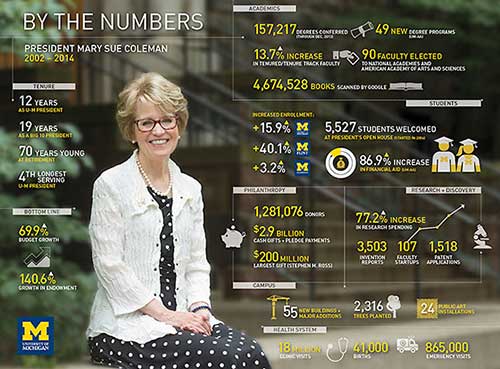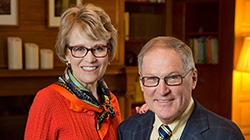Mary Sue Coleman will retire in July after serving 12 years as University of Michigan president. Under her leadership the University has expanded the institution’s commitment to academic collaborations and to economic development.
She will leave the University after having guided it successfully through difficult economic times, the purchase of the former Pfizer property that is now the North Campus Research Complex, and the hosting of visits by Presidents Obama and Clinton.
In question-and-answer format she reflects on some of her memorable moments as the University’s 13th president and looks ahead toward retirement.

View an enlarged version of this image.
You are in the final months of your presidency, which has spanned 12 years. How does it feel to be stepping down?
MSC: It’s time. This has been the most rewarding experience in my career. I’ve spent my entire professional life at public universities, and the University of Michigan has been the pinnacle of a very satisfying career. This is an elite institution in quality, but it has always had a strong public ethos and, from its earliest days, made a public impact.
Of course there are bittersweet moments that come with retiring. I interact daily with the most fascinating people. I particularly love walking across campus and talking with students. I’ll miss that. Nothing gives me more energy, or makes me feel more hopeful.
What stands out for you as memorable Michigan moments?
MSC: That could be a very long answer.
A memorable moment is not always pleasant. I will never forget the tragedy of losing our Survival Flight crew in 2007. These were six men committed to saving a human life, and they perished while transporting life-saving organs. It was devastating for so many people. It’s a painful chapter in our campus history that I will always remember.
Thankfully, there are many more pleasant memories.

Basketball’s Jordan Morgan posted this photo on Twitter at #ThankYouMarySue.
It was a privilege to stand on the steps of the U.S. Supreme Court with the University’s leadership team in 2003, when the justices upheld our use of affirmative action to build a diverse student body.
The Michigan Difference campaign was terrific, and we continue to see the impact of giving in our programs and student support.
Hosting both President Obama and President Clinton was very special, because it speaks to the strength of Michigan that they chose to address our graduating students.
And there are just many, many times when I enjoyed terrific, stimulating conversations with our students, staff, and faculty. There is an energy on our campus that is palpable, and unlike anything I’ve encountered at other institutions. It’s infectious.
You made a point of either establishing or expanding partnerships with universities in other countries — more so than any of your predecessors. Why was this a priority?
MSC: When James Angell was U-M president in the late 1800s, he traveled to China as our country’s first ambassador. It took him nearly three weeks to cross the Pacific Ocean to reach his new post.
In that same time frame today, a faculty delegation flies to another country—Ghana, Brazil, or India—learns about discoveries, academic programs, student exchanges, and more, and is back in Ann Arbor, with two weeks to spare. So technology plays a huge role in expanding our partnerships.
More important is understanding that we do not have all the answers; working with colleagues at Shanghai Jiao Tong University or the University of Pretoria allows us to leverage collective strengths. And these partnerships provide invaluable opportunities for students and faculty to experience new cultures as they pursue their studies and scholarship.
Did you ever feel any additional pressure as U-M’s first female president?
MSC: Never. I came here from the University of Iowa, where I also was the first female president, so I was accustomed to the “first” description. I certainly understand the importance and the symbolism of my appointment here. At the same time, I have never viewed my actions or decisions through the lens of gender.
It’s important for young people to have role models who look like them. I have met many times with women students here at U-M who are pursuing careers in the sciences. I’ve always been happy to share my experiences. When I was a graduate student in biochemistry, half the students were women, but none of our professors was a woman.
Having said that, I want to be a role model for both women and men, particularly students and faculty. I am always cognizant of the tremendous responsibility I have been given as president of one of the world’s great research universities.
What was the biggest decision you made as president?
Top accomplishments:
- North Campus Research Complex
- Economic development
- Residential Life Initiatives
- Interdisciplinary Junior Faculty Initiative
- Google partnership
MSC: Despite what many might assume, being a university president does not carry a lot of power. In the tradition of American higher education, I cannot fire a professor, or tell a dean what courses should be taught, or demand that students attend class.
But as president, I have a bully pulpit and my words have impact. My strength as a leader comes with the power of persuasion and voicing the values we hold high as a place of learning and research. I have worked to do that, particularly in promoting diversity in the classroom, economic development, affordability and access, and the vast contributions of public research universities.
I have had the support of our Board of Regents in several historic actions: purchasing the old Pfizer property to establish the North Campus Research Complex is probably the most significant. That was a decision that will resonate, I believe, for decades. I feel the same way about our decision to partner with Google and digitize our library holdings. I’m proud to have been part of both decisions.
What drove you to a career in higher education?
MSC: My parents played an essential role. My father was a chemistry professor and loved his work. My mother was the first in her family to attend college and became an English teacher.
While they never pushed me into higher education specifically, my parents always stressed the incalculable value of an education to my sisters and me. Do not expect someone else to provide for you — that was their message. And we heard them. My older sister became a physician and my younger sister an attorney.
I always loved science and was encouraged by my parents, teachers, professors, and mentors. I will always be grateful for that. Role models are so important at all levels of education.
Any regrets as president?
MSC: I wish we had made greater progress as an institution in attracting and retaining more underrepresented minority students. We have been very focused on working with high school counselors, families, churches, alumni, and the students themselves.
We know underrepresented minority students are applying to U-M and being admitted; the challenge is in convincing them to commit to attending Michigan. And that decision can sometimes hinge on financial aid; that is not always the case, but we do know there is tremendous competition for academically excellent students.
It’s important to know we have tools at our disposal. I encourage all to examine the Alumni Association’s LEAD Scholars Program. Ken and I have supported it for years and will continue to do so. It is a powerful program that builds diversity, in multiple ways, by providing financial support to underrepresented students.
I always want it known that we are a university that is welcoming, nurturing, and inspiring to all of our faculty, staff, and students.
We absolutely must widen our doors so that individuals from all backgrounds can take advantage of what we have to offer. A great public university can do nothing less. And so we are redoubling of efforts, and I know President-elect Mark Schlissel shares the commitment.
How do you plan to spend your retirement?
MSC: It won’t be retirement in the traditional sense. I continue to have great enthusiasm about higher education and its indispensable role in our society.
I will be co-chairing the Lincoln Project, an initiative of the American Academy of Arts and Sciences to address the challenges facing public research universities. My fellow co-chair is Robert Birgeneau, chancellor emeritus of the University of California-Berkeley, and we have a thoughtful group of advisers from higher education, government, the nonprofit sector, and business.
I have also joined several foundation boards and national advisory groups in areas I care deeply about.
At the same time, my calendar will be more open. Ken and I are looking forward to enjoying life in Ann Arbor. We have always lived in college towns, and there is something quite special about this community. It will be nice to participate more actively in the community.
We also want to travel, and are looking forward to a trip to Spain. Ken speaks fluent Spanish, and I intend to learn conversational Spanish. And we will spend time in Denver with our son and his family. We anticipate the next chapter of our lives will be very full and very rewarding.
Your involvement with the Lincoln Project indicates you’re concerned about the future of higher education.
MSC: I’m deeply concerned about both the financial and moral commitment of our country to public higher education. This is one of the crown jewels of our nation and a hallmark of our democracy. And yet we as a society have become cynical about the value and worth of public universities.
There has been a serious divestment in higher education by the states, at the same time the federal government is cutting research funding. The urgency and priority our nation placed on research spending in the 20th century is now being mimicked by China and other nations in the 21st century. In fact, China is investing in R&D spending at six times the U.S. rate.
The United States still spends more on R&D than any other nation. But we should be looking over our shoulder, because we are being challenged on a global scale.
Universities have a responsibility, too. We need to control costs and keep college affordable. We’ve done a good job of that here, and need to continue looking for ways to effect savings. And higher education overall must do a better job of demonstrating how we help change the world for the better.
In addition to our commitment, we need the federal and state government to re-invest in the innovation and talent creation at our universities. Otherwise we find ourselves in an almost impossible situation.
What advice will you give Mark Schlissel as U-M’s 14th president?
MSC: It’s very simple: Enjoy what I believe is the best job in higher education.
This story appears courtesy of the The University Record, which published a special issue about Coleman’s career on March 10, 2014.





Nancy Kosobud - 1965
Dear President Coleman,
Over your twelve years as president, I have watched the university increase research funding, maintain high academic standards, fight for diversity and increase its impact on its community while state funding was decreasing and the Michigan economy was in shambles. Thank you for your efforts to increase the quality and strength of the university in very tough times.
The success of the University of Michigan has helped to counter my pain in watching the demise of Detroit where I was born and grew up.
Thank you and best wishes,
Nancy Welch Kosobud
Reply